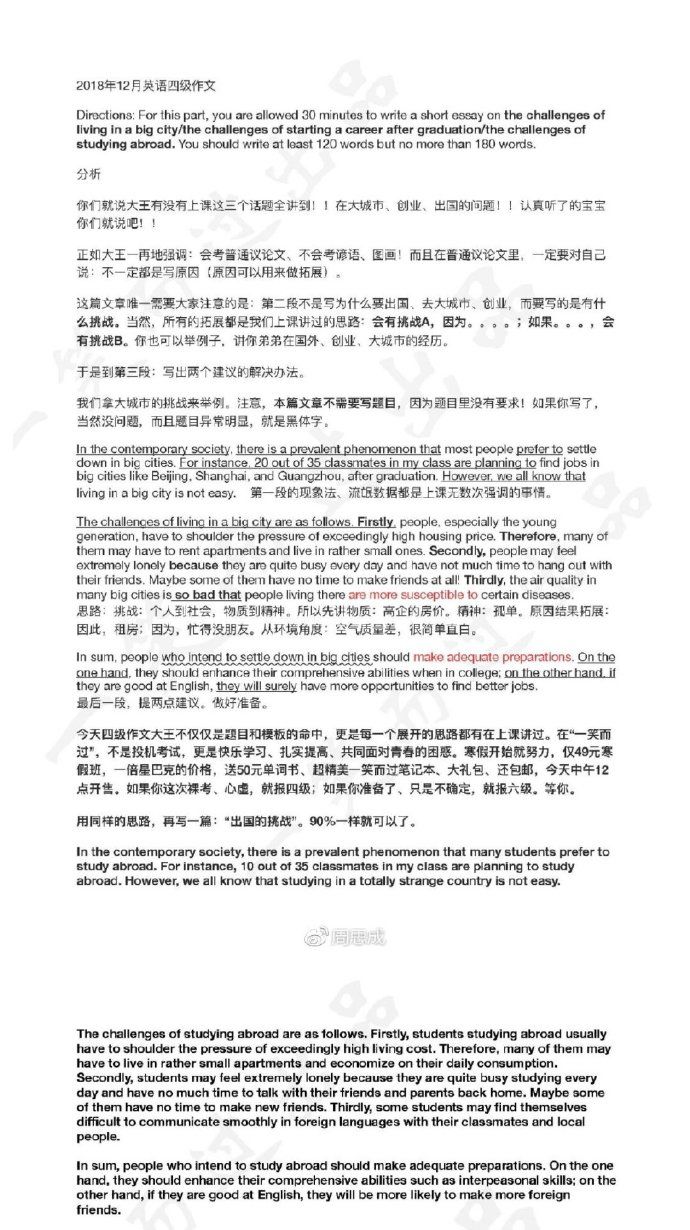LSAT考试模拟试题TEST2-2c
|
14. The mayor boasts that the average ambulance turnaround time, the time from summons to delivery of the patient, has been reduced this year for top-priority emergencies. This is a serious misrepresentation. This “reduction” was produced simply by redefining “top priority.” Such emergencies used to include gunshot wounds and electrocutions, the most time-consuming cases. Now they are limited strictly to heart attacks and strokes. Which one of the following would strengthen the author's conclusion that it was the redefinition of “top priority” that produced the reduction in turnaround time? (A) The number of heart attacks and strokes declined this year. (B) The mayor redefined the city's financial priorities this year. (C) Experts disagree with the mayor's definition of “top-priority emergency.” (D) Other cities include gunshot wound cases in their category o top-priority emergencies. (E) One half of all of last year's top-priority emergencies were gunshot wounds and electrocution cases. 15. In a large residential building, there is a rule that no pets are allowed. A group of pet lovers tried to change that rule but failed. The rule-changing procedure outlined in the building's regulations states that only if a group of tenants can obtain the signatures of 10 percent of the tenants on a petition to change a rule will the proposed change be put to a majority vote of all the tenants in the building. It follows that the pet lovers were voted down on their proposal by the majority of the tenants. The argument depends on which one of the following assumptions? (A) The pet lovers succeeded in obtaining the signatures of 10 percent of the tenants on their petition. (B) The signatures of less than 10 percent of the tenants were obtained on the pet lovers' petition. (C) Ninety percent of the tenants are against changing the rule forbidding pets. (D) The support of 10 percent of the tenants for a rule change ensures that the rule change will be adopted. (E) The failure of the pet lovers to obtain the signatures of 10 percent of the tenants on their petition for a rule change ensures that the rule change will be voted down by a majority of the tenants. 16. Nuclear fusion is a process whereby the nuclei of atoms are joined, or “fused,” and in which energy is released. One of the by-products of fusion is helium-4 gas. A recent fusion experiment was conducted using “heavy” water contained in a sealed flask. The flask was, in turn, contained in an air-filled chamber designed to eliminate extraneous vibration. After the experiment, a measurable amount of helium-4 gas was found in the air of the chamber. The experimenters cited this evidence in support of their conclusion that fusion ad been achieved. Which one of the following, if true, would cast doubt on the experimenters' conclusion? (A) Helium-4 was not the only gas found in the experiment chamber. (B) When fusion is achieved, it normally produces several by-products, including tritium and gamma rays. (C) The amount of helium-4 found in the chamber's air did not exceed the amount of elium-4 that is found in ordinary air. (D) Helium-4 gas rapidly breaks down, forming ordinary helium gas after a few hours. (E) Nuclear fusion reactions are characterized by the release of large amounts of heat. 17. Every photograph, because it involves the light rays that something emits hitting film, must in some obvious sense be true. But because it could always have been made to show things differently than it does, it cannot express the whole truth and, in that sense, is false. Therefore, nothing can ever be definitively proved with a photograph. Which one of the following is an assumption that would permit the conclusion above to be properly drawn? (A) Whatever is false in the sense that it cannot express the whole truth cannot furnish definitive proof. (B) The whole truth cannot be known. (C) It is not possible to determine the truthfulness of a photograph in any sense. (D) It is possible to use a photograph as corroborative evidence if there is additional evidence establishing the truth about the scene photographed. (E) If something is being photographed, then it is possible to prove definitively the truth about it. Questions 18-19 Some cleaning fluids, synthetic carpets, wall paneling, and other products release toxins, such as formaldehyde and benzene, into the household air supply. This is not a problem in well-ventilated houses, but it is a problem I houses that are so well insulated that they trap toxins as well as heat. Recent tests, however, demonstrate that houseplants remove some household toxins from the air and thereby eliminate their danger. In one test, 20 large plants eliminated formaldehyde from a small, well-insulated house. 18. Assume that a person who lives in a small, well-insulated house that contains toxin-releasing products places houseplants, such as those tested, in the house. Which one of the following can be expected as a result? (A) There will no longer be any need to ventilate the house. (B) The concentration of toxins in the household air supply will remain the same. (C) The house will be warm and have a safe air supply. (D) If there is formaldehyde in the household air supply, its level will decrease. (E) If formaldehyde and benzene are being released into the household air supply, the quantities released of each will decrease. 19. The passage is structured to lead to which one of the following conclusions? (A) Houseplants can remove benzene from the air. (B) Nonsynthetic products do not release toxins into houses. (C) Keeping houseplants is an effective means of trapping heat in a poorly insulated house. (D) Keeping houseplants can compensate for some of the negative effects of poor ventilation. (E) The air in a well-insulated house with houseplants will contain fewer toxins than the air in a well-ventilated house without houseplants |








